Unit2 body language 知识点归纳
牛津深圳版八年级下册英语Unit 2 Body language重点单词、短语、句子 课件
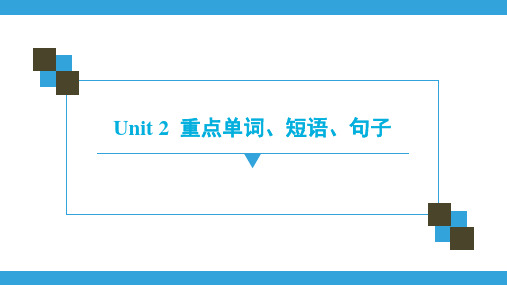
5.gesture: the movements that you make with your hands, your head or your face to show a particular meaning 手势 n
6.message: information 信息 n. (messenger n.) 7.bored: not interested 厌倦的;烦闷的 adj. (boring adj.) 8.part-time: for part of the day or week in which people work 业
6.It can be the key to communication. 它是沟通的关键。
7.An Asian person might look down while listening to a Western speaker. 一个亚洲人可能会在听西方演讲者说话时低头。
8.Why don’t you go to …? 你为什么不去……呢?
起 v.
18.cross: put or place sth. across or over sth. else 使……交叉; 使……交叠 v. (crossing n.)
19.shake: to take one’s hand to move it up and down as greeting 握手 v.(shake-shook-shaken)
余的;兼职的 adj.
9.well-dressed: wearing nice clothes 衣着入时的;穿着讲究的 adj. 10.lady: woman/ madam 女士 n. 11.expression: a look on a person’s that shows their thoughts or
unit 2 body language 全面知识点

Unit 2 Body LanguageReading1.what’s wrong with sb.? 某人怎么了?2.talk to=talk with3.take place =happen 发生4.肢体语言:look up抬头看(查阅…) look down低头sit up straight 坐直look happy/bored/friendly, smile 更多:steps, gestures and expressions on their faces. 步伐,姿态和脸上的神情Cross one’s arm交叉手臂于胸前shake hands握手shake one’s head摇头nodding one’s head点头Eye contact眼神交流5.they are both students = both of them are students both放be动词后They both have part-time jobs. both 放实义动词前we both go to school in school uniform(校服)6.a well-dressed lady穿着考究的女士(整洁的)7.walk over to 走向…come over走过来walk over走过去8.give sb. a cheerful greeting 给某人一个欢快的问候9.sigh叹息10.walk away走开了11.what is the matter?发生了什么事= what is wrong with you?12.instead of 而不是I went to see a film instead of staying at home.13.it is the way you communicate. 它是你交流的方式(出了问题)14.get a chance to do= have a chance to do. Jim got a chance to talk to Mr Lu.municating is more than just speaking. more than 不仅仅是We are more than teaching you knowledge. 我们不仅仅是传授知识.The cook is more than cooking meal. 那个厨师不单单是在做饭.(比如:还蕴含一些为人处世的道理)16.on your face.17.your whole appearance你整个的外观,外貌,形象Pop stars usually have good appearance.(外貌)18.give sb. a good impression = leave a good impression on sb._________________________19.turn your head towards me. 转你的头向着我。
英语八年级下unit_2《body language》word重点内容整理
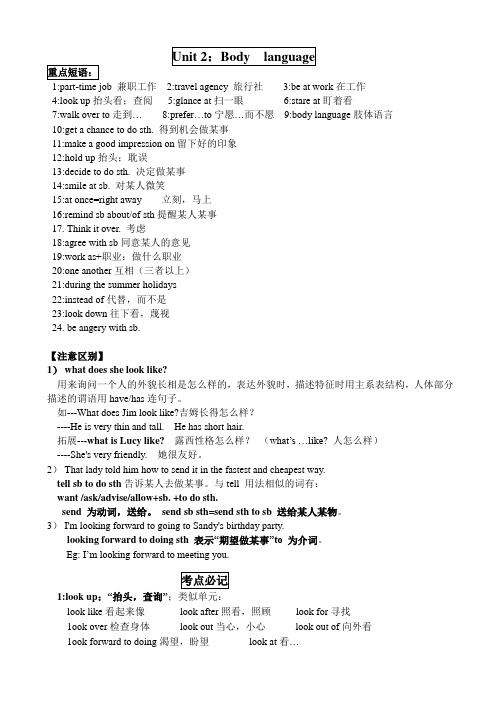
1:part-time job 兼职工作2:travel agency 旅行社3:be at work在工作4:look up抬头看;查阅5:glance at扫一眼6:stare at盯着看7:walk over to走到… 8:prefer…to宁愿…而不愿9:body language肢体语言10:get a chance to do sth. 得到机会做某事11:make a good impression on留下好的印象12:hold up抬头;耽误13:decide to do sth. 决定做某事14:smile at sb. 对某人微笑15:at once=right away 立刻,马上16:remind sb about/of sth提醒某人某事17. Think it over. 考虑18:agree with sb同意某人的意见19:work as+职业:做什么职业20:one another互相(三者以上)21:during the summer holidays22:instead of代替,而不是23:look down往下看,蔑视24. be angery with sb.【注意区别】1)what does she look like?用来询问一个人的外貌长相是怎么样的,表达外貌时,描述特征时用主系表结构,人体部分描述的谓语用have/has连句子。
如---What does Jim look like?吉姆长得怎么样?----He is very thin and tall. He has short hair.拓展---what is Lucy like? 露西性格怎么样?(what’s …like? 人怎么样)----She's very friendly. 她很友好。
2)That lady told him how to send it in the fastest and cheapest way.tell sb to do sth告诉某人去做某事。
深圳新版八下英语Unit-2-Body-language-(单词、词组、reading部分知识点)
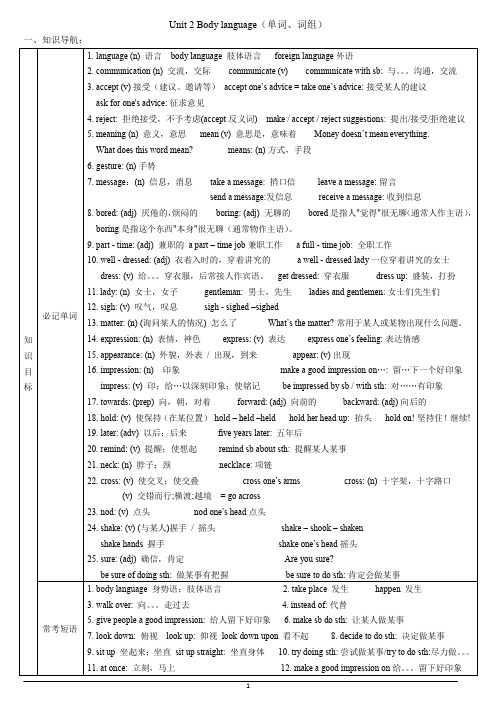
Unit 2 Body language(单词、词组)一、知识导航:二、要点全解:1. angry(生气的), excited(感到兴奋的), happy(高兴的), surprised(惊讶的) (1) angry (adj) 生气的angrily (adv)anger (n)be angry with sb: 生某人的气跟踪练习: “Why are you late for school again?” said his teacher . (angry)(2) excited (adj) 感到兴奋的,多指人对事物的感受,主语一般为人。
be excited about / at / by sth: 对。
感到兴奋e.g.: I am excited about the film. 我对这部电影感到兴奋。
【拓展】exciting (adj) 令人兴奋的,多指事物对人的影响,一般修饰物。
e.g.: Have you heard of the exciting news? 你听说那个令人兴奋的消息了吗? 【一言辩异】I was very excited after watching the exciting football match.观看了那场令人兴奋的足球比赛后,我感到非常兴奋。
(3) happy (adj) 高兴的 反义词: unhappyhappily (adv)happiness (n)(4)surprised (adj) 惊讶的多指人对某事感到惊讶,主语一般为人。
be surprised to do sth: 吃惊的做某事 be surprised at sth: 对某事感到惊讶be surprised + that 从句: 惊奇。
I am surprised to hear you say that.【拓展】① surprising: (adj) 令人惊讶的,表示某物令人惊讶。
It is a rather surprising achievement. 它真是个令人惊异的成就。
初二英语下Unit 2 Body Language教学笔记(17)
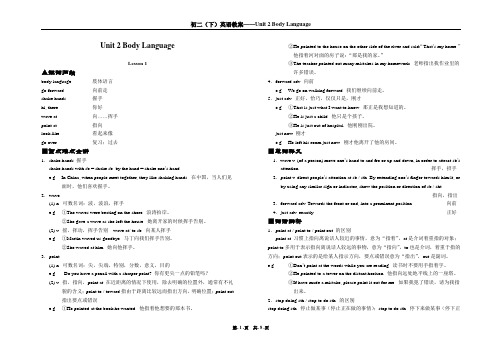
Unit 2 Body LanguageLesson 1▲短词归纳body language 肢体语言go forward 向前走shake hands 握手hi, there 你好wave at 向……挥手point at 指向look like 看起来像go over 复习;过去■重点难点全讲1.shake hands 握手shake hands with sb.= shake sb. by the hand = shake one’s hande.g. In China, when people meet together, they like shaking hands. 在中国,当人们见面时,他们喜欢握手。
2.wave(1) n. 可数名词:波,波浪,挥手e.g. ①The waves were beating on the shore. 浪涛拍岸。
②She gave a wave as she left the house. 她离开家的时候挥手告别。
(2) v. 摇,挥动,挥手告别wave at/ to sb. 向某人挥手e.g. ①Martin waved us goodbye. 马丁向我们挥手告别。
②She waved at him. 她向他挥手。
3.point(1) n. 可数名词:尖,尖端,特别,分数,意义,目的e.g. Do you have a pencil with a sharper point? 你有更尖一点的铅笔吗?(2) v. 指,指向,point at 在近距离的情况下使用,除去明确的位置外,通常有不礼貌的含义;point to / toward指由于距离比较远而指出方向,明确位置;point out指出要点或错误e.g. ①He pointed at the book he wanted. 他指着他想要的那本书。
②He pointed to the house on the other side of the river and said:“That’s my home.”他指着河对面的房子说:“那是我的家。
沪教牛津版八年级下Unit 2 Body language 考前必背

3. look down俯视
4. look up(在低头看某物时)抬头向上看;(在词典、参考书中或通过电脑)查阅;查检
5. sit up坐起来;坐直
6. walk away走开
7. instead of代替;而不是
8. more than多于;超过
9. make sb. do sth.使某人做某事
21. remind v.提醒;使想起
22. neck n.颈;脖子
23. cross v.使交叉;使交叠
24. nod v.点头
25. shake v.(shook,shaken)(与某人)握手v.(shook,shaken)摇头
26. sure adj.确信;肯定
重
点
短
语
1. body language身势语;肢体语言
页)交流不仅仅指说话。
3. But it’s more important for me to develop other skills at
the moment.(教材第20页)但是目前对我来说更重要的
是发展别的技能。
4. Why don’t you go skating?(教材第26页)你为什么
Module 1Social communication
Unit 2Body language
考前必背
重
点
单
词
1. languagen.语言
2. communicationn.交流;交际
3.*balletn.芭蕾舞
4. acceptv.接受(建议、邀请等)
5.*rejectv.拒绝接受;不予考虑
6. meaningn.意义;意思
(教育科学版)初二Unit2BodyLanguage
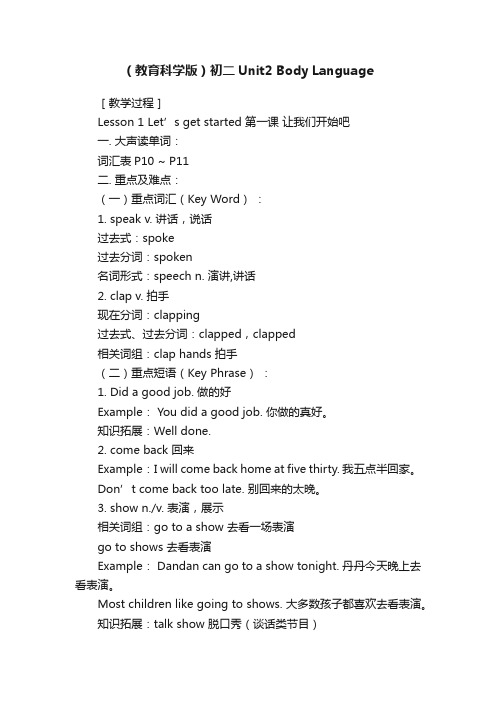
(教育科学版)初二Unit2 Body Language[教学过程]Lesson 1 Let’s get started 第一课让我们开始吧一. 大声读单词:词汇表P10 ~ P11二. 重点及难点:(一)重点词汇(Key Word):1. speak v. 讲话,说话过去式:spoke过去分词:spoken名词形式:speech n. 演讲,讲话2. clap v. 拍手现在分词:clapping过去式、过去分词:clapped,clapped相关词组:clap hands 拍手(二)重点短语(Key Phrase):1. Did a good job. 做的好Example: You did a good job. 你做的真好。
知识拓展:Well done.2. come back 回来Example:I will come back home at five thirty. 我五点半回家。
Don’t come back too late. 别回来的太晚。
3. show n./v. 表演,展示相关词组:go to a show 去看一场表演go to shows 去看表演Example: Dandan can go to a show tonight. 丹丹今天晚上去看表演。
Most children like going to shows. 大多数孩子都喜欢去看表演。
知识拓展:talk show 脱口秀(谈话类节目)fashion show 服装表演mime show 哑剧表演,默剧表演4. by + 点钟到…点by 8 o’clock : not later than 8 o’clockExample:You should come back home by 10 o’clock. 你应该在十点之前回家。
5. in the library 在图书馆Example:I want to read in the library. 我想在图书馆里读书。
北京课改版英语九年《Unit 2 Body language》word知识精讲
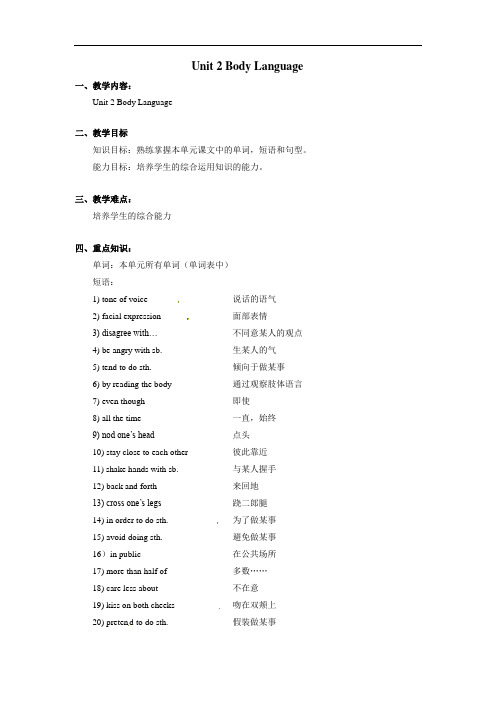
Unit 2 Body Language 一、教学内容:Unit 2 Body Language二、教学目标知识目标:熟练掌握本单元课文中的单词,短语和句型。
能力目标:培养学生的综合运用知识的能力。
三、教学难点:培养学生的综合能力四、重点知识:单词:本单元所有单词(单词表中)短语:1) tone of voice 说话的语气2) facial expression 面部表情3) disagree with…不同意某人的观点4) be angry with sb. 生某人的气5) tend to do sth. 倾向于做某事6) by reading the body 通过观察肢体语言7) even though 即使8) all the time 一直,始终9) nod one’s head 点头10) stay close to each other 彼此靠近11) shake hands with sb. 与某人握手12) back and forth 来回地13) cross one’s legs 跷二郎腿14) in order to do sth. 为了做某事15) avoid doing sth. 避免做某事16)in public 在公共场所17) more than half of 多数……18) care less about 不在意19) kiss on both cheeks 吻在双颊上20) preten d to do sth. 假装做某事五、重点知识讲解:1. Do you know body language? Do you know that more than half of our ideas or f eelings are expressed by our tone of voice, our facial expressions, our gestures and the way we position our body when we speak? We can read the mind by understanding these non-verbal messages.译文:你了解肢体语言吗?你知道我们的多数想法或感情都是由我们说话时的语气、面部表情、手势和身体的姿势所表达的吗?我们可以通过这些非言语的信息来理解人的心思。
- 1、下载文档前请自行甄别文档内容的完整性,平台不提供额外的编辑、内容补充、找答案等附加服务。
- 2、"仅部分预览"的文档,不可在线预览部分如存在完整性等问题,可反馈申请退款(可完整预览的文档不适用该条件!)。
- 3、如文档侵犯您的权益,请联系客服反馈,我们会尽快为您处理(人工客服工作时间:9:00-18:30)。
Unit 2 Body language 背记重点
1. communication skills 交流技巧
communicate with sb. 与某人沟通
e.g. I like to communicate with the old. 我喜欢与老人交流。
2. the meaning of ……的意思
e.g. If you don’t know the meaning of the word, please look it up in a dictionary.
如果你不知道这个词的意思,请查一下字典。
3. make an impression on sb.= leave an impression on sb.= give sb. a good impression
e.g. He made a good first impression on her father. 他给她的父亲留下了很好的第一印象。
4. take place 有计划地发生注意:它无被动语态(Unit5内容)
e.g. The meeting will take place soon.
会议即将举行。
5. remind sb. of/about sth. 使某人想起某事;提醒某人某事
e.g. This old picture reminds me of my childhood in the country.
这张老图片使我想起了我在农村的童年。
remind sb. that +从句提醒某人……
e.g. I’m calling you to remind you that we’ll meet at the school gate tomorrow morning.
我打电话给你是为了提醒你我们明天早上要在学校门口见面。
6. instead of 代替,而不是
instead of doing sth. 代替做某事
People always choose Debbie instead of me. 人们总是选择Debbie而不是我。
I ride bike to school instead of taking a bus. 我骑自行车代替搭公车去学校。
7. 拓展短语
语法:动名词(doing)
1. 做主语:
(1)一个动名词做主语,谓语动词用第三人称单数:
Smiling shows that you are happy. 微笑表明你很开心。
Ballet training usually starts at an early age. 芭蕾舞训练通常从很小的年纪就开始。
Dancing is her favorite hobby. 跳舞是我最喜欢的喜好。
(2)两个或两个以上不同的动名词作主语,谓语用复数:
Playing football and learning English are my hobbies. 踢足球和学英语是我的爱好。
Sighing and closing my eyes show that I am sad. 叹气和闭眼表明我很伤心。
2. 作宾语
(1)动词+ V-ing:
1. enjoy doing sth. 喜欢做某事;享受做某事
2. suggest doing sth. 喜欢做某事
3. mind doing sth. 介意做某事
4. finish doing sth. 完成做某事
5. practise doing sth. 介意做某事
6. imagine doing sth. 想象做某事
7. deny doing sth. 否认做某事
8. keep doing sth. 继续做某事
9. miss doing sth. 错过做某事
10. avoid doing sth. 避免做某事
11. admit doing sth. 承认做某事
(2)介词+ V-ing
12. prefer doing sth. to doing sth. 对比to后的事情,更喜欢做前面的事情
13. be used to doing sth 习惯做某事
14. look forward to doing sth. 期望做某事
15. feel like doing sth. 想做某事
16. give up doing sth. 放弃做某事
17. keep on doing sth. 反复做某事;不断做某事
18. succeed in doing sth. 成功地做某事
19. insist on doing sth. 坚持做某事
3. 惯用法
20. be busy doing sth. “忙于做某事”
21. be worth doing sth. “值得做某事”
22. It’s no use / good doing sth. “做……无用/ 无好处”
4. 既能加to do 又能加doing 的动词
23. try doing sth. 试着做某事(新的尝试)
try to do sth. 努力做某事(想达到目的)
24. stop doing sth. 停止做某事
stop to do sth. 停下来做另一件事
25. remember doing sth. 记得做过某事
remember to do sth. 记得要做某事
26. forget doing sth. 忘记做过某事
forget to do sth. 忘记要做某事。
